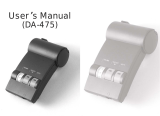
I can't hear a dial tone in the
headset.
Adjust the configuration with on the switcher until a dial tone is
heard.
Fine tune the listening volume with the headset volume button.
If the volume is still too low, adjust the listening volume dial on the
switcher.
Make sure the lifter is lifting the handset high enough too operate
the hookswitch; set to a higher setting if necessary.
If you are using a wireless headset, ensure your headset is
subscribed to the USB adapter. See subscription instructions that
came with your wireless headset.
Make sure your headset is charged.
Press the call button on your headset.
I hear static.
If you are using a wireless headset, ensure there is at least 12
inches between the switcher and your computer, and 6 inches
between the switcher and your desk phone If adjusting the
distance doesn't help, your headset is going out of range, move
closer to the switcher
The sound is distorted.
Lower the speaking volume dial and/or listening volume dial on the
switcher. For most telephone the correct setting is position 3.
If your desk phone has a volume control, lower until the distortion
disappears,
If the distortion is still present, adjust the headset volume control
to lower the headset speaker volume. If the distortion persists
lower the listening volume dial on the switcher.
If you are using a wireless headset, ensure there is at least 12
inches between the switcher and your computer, and 6 inches
between the switcher and your desk phone.
I hear echo in the headset.
Lower the listening volume and the speaking volume dials on the
switcher. For most telephone, the correct setting is position 3.
If the audio level is too low in this position, adjust the headset
volume control to increase the headset speaker volume.
If your speaking volume is too low for your listener in this position,
adjust the position of the headset to make sure the microphone is
as close as possible to your mouth.
Adjust the Configuration Switch. The most commonly used
position is "A", which is the default position.
People I talk to can hear a buzz in
the background.
If you are using a wireless headset, move the switcher further
away from your phone.
If the power supply (HL10 lifter only) is plugged into a power strip,
plug it into the wall directly.
The handset lifter is installed but
does not lift the handset.
Be sure the headset lifter power cord is firmly pushed into the
handset lifter jack on the switcher.
When I dial from my softphone
application, nothing happens.
Ensure that the headset is the default sound device. The control
panel will launch the sound devices control panel by going to
Control Panels > Sound
Troubleshooting
Desk phone
Softphone
15


















